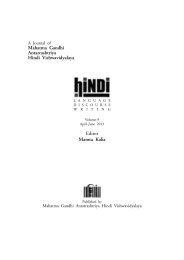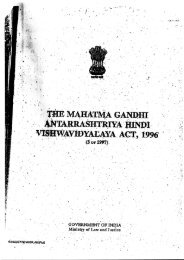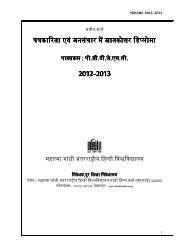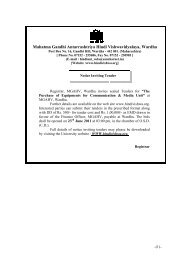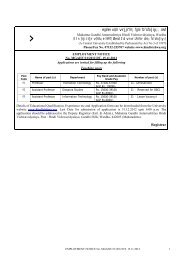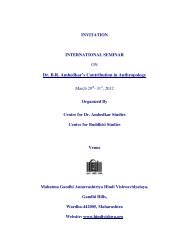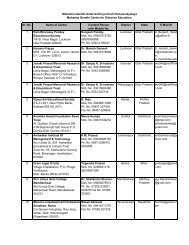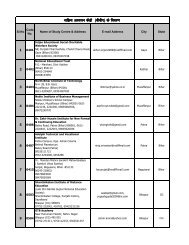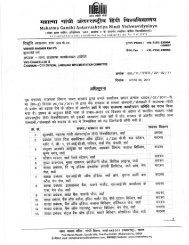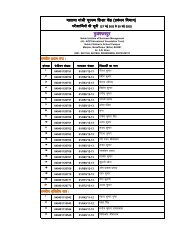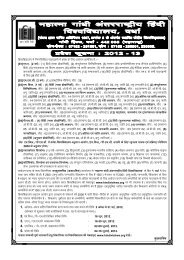Mamta Kalia
Mamta Kalia
Mamta Kalia
Create successful ePaper yourself
Turn your PDF publications into a flip-book with our unique Google optimized e-Paper software.
of my friendship with Chandrapal had<br />
become instantly visible. I had been<br />
released from the taunts and the<br />
hectorings of the Tyagi boys. Now I<br />
did not have to stand waiting near the<br />
tap for a drink of water. They all lost<br />
their tongues when Chandrapal was<br />
around. He could hit anyone he wanted.<br />
Even otherwise, the Tyagi boys were<br />
afraid of the Gujjar boys.<br />
I had stood first in my section in<br />
the half-yearly exam. My results bolstered<br />
my self-confidence. I was made the class<br />
monitor after the examination and my<br />
seat was moved from the back of the<br />
class to the front. The behaviour of some<br />
teachers, however, was still unfriendly.<br />
They were indifferent and contemptuous<br />
of me.<br />
I was kept out of extracurricular<br />
activities. On such occasions I stood<br />
on the margins like a spectator. During<br />
the annual functions of the school, when<br />
rehearsals were on for the play, I too<br />
wished for a role. But I always had to<br />
stand outside the door. The so called<br />
descendants of gods cannot understand<br />
the anguish of standing outside the door.<br />
All the teachers were Tyagis, and<br />
among the students too Tyagis were in<br />
the majority. No one could afford to<br />
say anything against them. During the<br />
examinations we could not drink water<br />
from the glass when thirsty. To drink<br />
water, we had to cup our hands. The<br />
peon would pour water from way high<br />
up, lest our hands touch the glass.<br />
There was a library in the school<br />
where books were gathering dust. It was<br />
in the library where I first became<br />
18 :: April-June 2010<br />
acquainted with books. By the time I<br />
reached class eight, I had read<br />
Saratchandra, Premchand and<br />
Rabindranath Tagore. Saratchandra’s<br />
characters had touched my child’s heart<br />
very deeply. I had become somewhat<br />
of an introvert, and reading had become<br />
my main passion.<br />
I had begun to read novels and short<br />
stories to my mother in the faint light<br />
of the wick lamp. Who knows how often<br />
Saratchandra’s characters have made a<br />
mother and son cry together? This was<br />
the beginning of my literary sensibility.<br />
Starting from Alha, the Ramayana and<br />
the Mahabharata to Sur Sagar, Prem<br />
Sagar, Sukh Sagar, Premchand’s stories,<br />
Kissa Tota Maina...<br />
whatever I found, I, the son of an<br />
untouchable illiterate family, read to my<br />
mother.<br />
In April 1993, an invitation came<br />
from Rajendra Yadavji, editor of Hans.<br />
He had organized a programme called<br />
‘Katha Kathan’ in the labourers’ colonies<br />
of Delhi, and I too got the chance to<br />
tell my stories there. The first event<br />
was at the Valmiki Temple at Mandir<br />
Marg. I experienced a strange emotion<br />
while narrating my story. That day the<br />
memories of my mother had come afresh<br />
all of a sudden. What better way to<br />
bridge the gap between literature and<br />
reader than Katha Kathan? The illiterate<br />
masses cannot read literature. Those who<br />
can read are unable to buy books. Katha<br />
Kathan provided an avenue for a<br />
meaningful dialogue between readers and<br />
writers.<br />
As my studies advanced, I began



